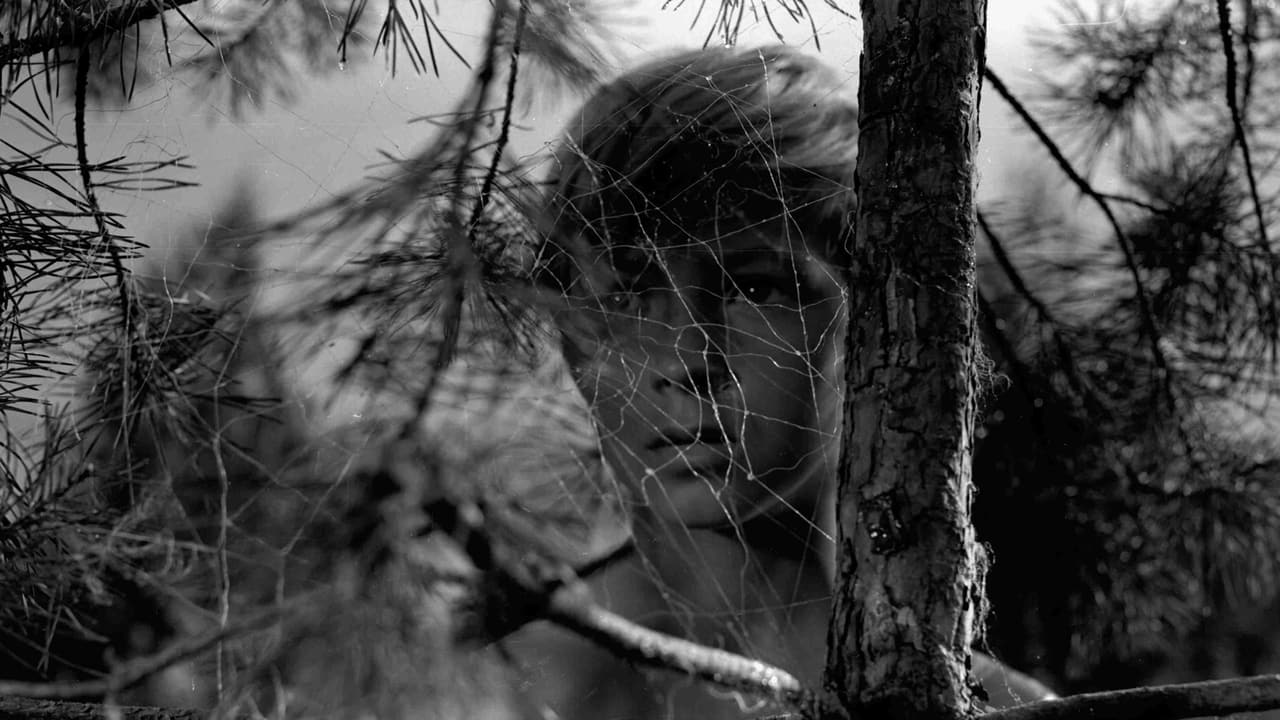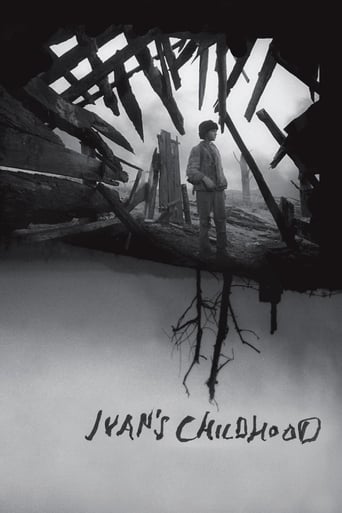

One of the best films i have seen
... View MoreFantastic!
... View MoreBoring, over-political, tech fuzed mess
... View MoreIt's simply great fun, a winsome film and an occasionally over-the-top luxury fantasy that never flags.
... View MoreTarkovsky's legitimate first feature film, IVAN'S CHILDHOOD walked off with the Golden Lion in Venice, an honor shared with Valerio Zurlini's FAMILY PORTRAIT (1962). At the age of 30, Tarkovsky extraordinarily implements his stupefying aesthetic tack to the hilt, the film can sweep any new audience off their feet tout court, and sends out a biting anti-war message with soul- pulverizing poignancy.WWII, Eastern front, our hero is a 12-year-old scrawny Russian boy Ivan (Burlyaev), who is left bereft and hell-bent in his reconnaissance vocation urged by an inexorable impulse of avenging, the front-line is not a place for child, Colonel Gryaznov (Grinko) intends to send him to a military school (and adopt him when the war is over), but Ivan is already a fearless soldier in defiance of his gaunt figure, after having prematurely experienced a baptism of fire out of man-made atrocity, which entirely traumatizes his child-like innocence, there is no propaganda whitewashing in his characterization, he is brusque to his senior comrades, reckless in his intent to stay on, and holds a skeptical world-view jarringly incommensurate with his age. That is what war can afflict an innocent child, changes him into an anomaly. Ivan is pestered by dreams of his past, the ephemeral peaceful time with his mother (Tarkovsky's wife Irina) and his younger sister, both perished along with his father. Mesmerizing shots and distinct compositions bombard audience in glut: a slam-bang swooping take strafing not far off his mother; the diagonal angle is scintillatingly deployed to eviscerate the shambolic and dilapidated state of affairs; a striking framing gimmick magnificently transpires when Ivan and his mother gaping into a well, and the camera looks towards them from under, which generates an ineffably magical vision contends to be the tenderest moment in this war-torn living hell. Also unforgettable is the camera-work's sublime attribute of foregrounding its close-ups and often pensive portraiture, which plays up the supreme chiaroscuro, second to none in its expressiveness and legerdemain, like the haunting imagery of the marshland during the last mission of Ivan and his companions, the young Lieutenant Galtsev (Zharikov) and Captain Kholin (Zubkov). Tarkovsky doesn't even for once, avail himself of point-blank combat - the modus operandi of warfare movies to grant a direct outlook of thrill and terror, because in his insightful and humanistic philosophy, a more horrifying and excruciating scourge is the pervading trepidation hovering around before the blood-letting, it gnaws under one's skin but downright ineradicable, and progressively it becomes inimical to the soundness of mind. The plot is being expectedly downplayed in favor of its atmospheric richness. The sub-plot digression into Kholin's imprudent flirtation with a young army nurse Marsha (Malyavia) conveys a faint discomfiture of carpe diem expedient, a knock-on aftermath under such extreme circumstances. Ivan never reaches his adulthood, all he has is a stunted childhood that he could only embrace during his slumbers, Burlyaev remarkably liberates Ivan's unceremonious singularity with both acerbity and compassion, and, it goes without saying, everyone looks more stylishly stark under Tarkovsky's exquisite mise-en-scène. A ground-breaking feature debut, IVAN'S CHILDHOOD wrestles gallantly with its unsettling subject and takes the risk to corroborate a somewhat inaccessible ideology in contrast with most patriotic offerings of its era, after all, what can a new viewer say after stumbling upon this time-tested masterwork? Just to be dazed and amazed!
... View MoreIvan's Childhood (Ivanovo Detstvo) is everything that I love about cinema. The cinematography, the direction, the unique transmissions and the atmosphere are what makes this war film like no other. I would describe this as a sinister fairy tale with a sense of poetry. What makes this even more impressive is that this is Andrei Tarkovsky first major film and we already got our first taste of Tarkovsky haunting vision.Nikolai Burlyayev is one of the best child actors I've ever seen in a movie. He completely blew me away in this, as he is the one that delivered all the hard hitting emotions that happens around him. It's pretty heartbreaking to witness shell shock from a young boy.This is definitely worth seeing. It's absolutely unmissable.
... View MoreMy review (it's in Portuguese) Plot form Wikipedia: On the Eastern front during World War II, the Soviet army is fighting the invading German Wehrmacht. The film features a non-linear plot with frequent flashbacks.After a brief dream sequence, Ivan Bondarev (Nikolai Burlyayev), a 12- year-old Russian boy, wakes up and crosses a war-torn landscape to a swamp, then swims across a river. On the other side, he is seized by Russian soldiers and brought to the young Lieutenant Galtsev (Evgeny Zharikov), who interrogates him. The boy insists that he call "Number 51 at Headquarters" and report his presence. Galtsev is reluctant, but when he eventually makes the call, he is told by Lieutenant-Colonel Gryaznov (Nikolai Grinko) to give the boy pencil and paper to make his report, which will be given the highest priority, and to treat him well. Through a series of dream sequences and conversations between different characters, it is revealed that Ivan's mother and sister (and probably his father, a border guard) have been killed by German soldiers. He got away and joined a group of partisans. When the group was surrounded, they put him on a plane. After the escape, he was sent to a boarding school, but he ran away and joined an army unit under the command of Gryaznov.Burning for revenge, Ivan insists on fighting on the front line. Taking advantage of his small size, he is successful on reconnaissance missions. Gryaznov and the other soldiers grow fond of him and want to send him to a military school. They give up their idea when Ivan tries to run away and rejoin the partisans. He is determined to avenge the death of his family and others, such as those killed at the Maly Trostenets extermination camp (which he mentions that he has seen).A subplot involves Captain Kholin (Valentin Zubkov) and his aggressive advances towards a pretty army nurse, Masha (Valentina Malyavina), and Galtsev's own undeclared and unrequited feelings for her. Much of the film is set in a room where the officers await orders and talk, while Ivan awaits his next mission. On the walls are scratched the last messages of doomed prisoners of the Germans.Finally, Kholin and Galtsev ferry Ivan across the river late at night. He disappears through the swampy forest. The others return to the other shore after cutting down the bodies of two Soviet scouts hanged by the Germans.The final scenes of the film then switch to Berlin under Soviet occupation after the fall of the Third Reich. Captain Kholin has been killed in action. Galtsev finds a document showing that Ivan was caught and hanged by the Germans. As Galtsev enters the execution room, a final flashback of Ivan's childhood shows the young boy running across a beach after a little girl in happier times. The final image is of a dead tree on the beach.
... View MoreThis film is a story about a 12 year old boy Ivan, who happened to spend his childhood within the world of Great Patriotic War. He wasn't supposed to be a part of such a cruel occurrence as war, but having lost parents, chose to help his companions-in-arms in risky and crucial way. In my opinion, Andrei Tarkovsky has made more an art house film than just a typical soviet military drama. We don't see cruel battles, we don't see divided by war love, we don't see a war itself after all. All we see is the consequences of the war in theirs different appearances. The objective of this movie is common - to show what gore and sorrow the war is holding. But Tarkovsky shows us this gore and sorrow in an interesting, unusual way, through the eyes of little boy, through his mind and dreams also. A black-and-white sharp and high-contrast shot adds definition and dramatic atmosphere to the picture. There are a lot of really frightening and inappropriate for children scenes in the movie shown by Tarkovsky in order to achieve necessary level of horror that war provides. So I think Andrei Tarkovsky made a great and strong film showing all horror and gore of war in a different style. A am sure, you won't see any familiar to this one military drama, it's totally unique.
... View More